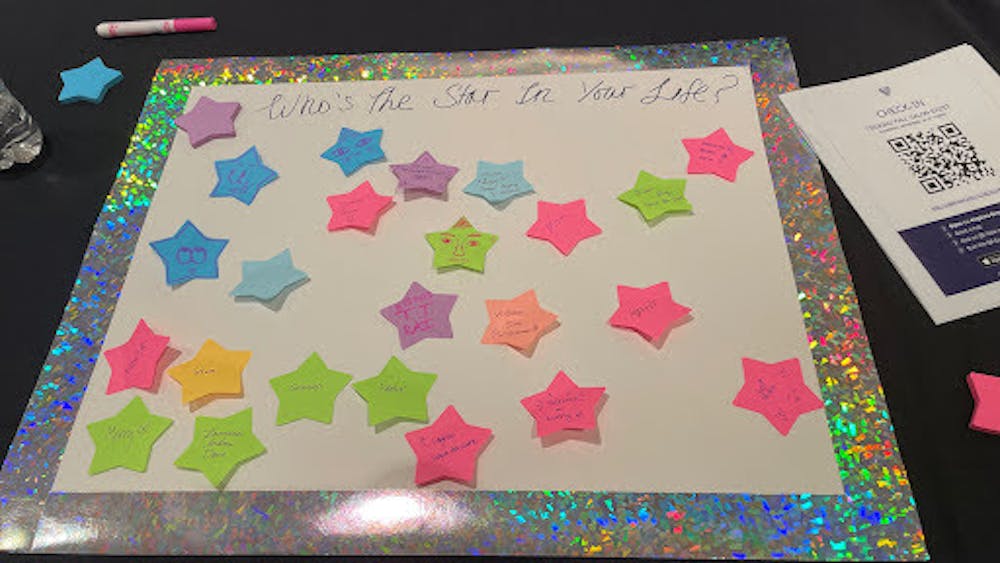TEDxJHU hosted its 2021 Fall Salon Event in Shriver Hall on Nov. 18. The Salon also featured the nonprofit organization Teach for America and an a cappella showcase from the Octopodes.
Senior Gracyn Sollmann, director of communications for TEDxJHU, opened the night with a story about this year’s “Among the Stars'' theme by recalling how she felt a sense of awe when she entered Hopkins.
She elaborated on this feeling in an interview with The News-Letter.
“I was enthralled with [fellow students’] interests and their passion with which they spoke about their interests,” she said.
Junior Yuqi Zhang, director of design, explained why this year’s theme was chosen in an interview with The News-Letter.
“It’s a theme opened for your own interpretation. ‘Stars’ can be people around you, can be ideas, insights and everything inspiring,” she said.
The first speaker of the night was freshman Thaissa Peixoto, who invited everyone to recall if they had looked at the emergency exit when Sollmann went over safety precautions.
Peixoto pointed out that few people had actually paid attention to the exits and offered an explanation for why.
“The reason why you didn't look at it was because we [are] all scared of danger and uncertainties,” she said. “When you are faced with something new, you fall back on something you did before.”
Peixoto suggested that everyone start planning for worst-case scenarios like smoke filling the auditorium or computers crashing during a midterm with mental models. Such contingency planning, she remarked, could end up being quite useful in the future.
Sophomore Faith Obilo complimented Peixoto’s talk in an interview with The News-Letter.
“Her discussion on mental models and embracing the worst-case scenario was riveting. The articulate manner [in which] she framed how having this mindset saved her life deeply resonated with me,” she said. “After her talk, I felt compelled to be more receptive to possible negative outcomes in my own life decisions.”
Next, freshman Steven Chen spoke about his hobby of repairing typewriters and how it inspired his interest in exploring hidden personal histories.
“History happens in things like typewriters or certain personal stories that people bring down and pass down to each other,” he said. “Personal histories are ways for someone to pass on their own meanings of the world, their personal knowledge or their own views of the world that are distinct from everyone else’s.”
Chen encouraged the audience to reach out to others and learn their histories.
“Talk to your mothers, talk to your fathers, talk to your grandparents — they may bore you with their stories, but at the end of the day, they might have unique viewpoints,” he said. “They might inspire you.”
The third speaker, senior Vara Mathiyalakan, talked about how listening makes one a better public speaker. Mathiyalakan first began his public-speaking journey by trying to make his speeches for Model United Nations (MUN) more intriguing.
During competitions, it seemed to Mathiyalakan that the fast-paced nature of MUN encouraged a focus on style rather than content, failing to spark any meaningful dialogue.
He highlighted how things changed with the pandemic when all tournaments became virtual. According to him, the sudden termination of the high-energy and charged atmosphere characteristic of in-person matches redirected him to focus on other people’s speeches for the first time.
By becoming a good listener, Mathiyalakan claimed, he was able to become a better speaker and reconcile style and content.
He also explained how competing on opposing sides of MUN conference debates has granted him new perspectives.
“The experience of competing on both teams for four years definitely made me unique... I’ve always wanted to speak about that impulse to be a generalist and not let the inevitability [of specializing] win,” he said.
Mathyalakan elaborated on his message in an interview with The News-Letter.
“I think especially as you get older in life, there’s really this tendency to narrow down on a few things, find your niche: ‘This would be my one thing, and that’s it,’” he said. "For me, I don’t want to be like that because I want to do multiple things.”
The final speaker, junior Morgan Raun, shared her personal experiences with saying no. She claimed that defining boundaries is far from simple, with inclinations to accommodate others taking root in childhood, and reflected on her pursuit of being “agreeable” to fit in with other kids. She also described her desire to look after troubled boys to her own detriment.
In an interview with The News-Letter, Raun remarked that society expects people to hide their emotions.
“Always presenting as nice and pleasant on the outside while hurting on the inside is a pretty common phenomenon, yet we don’t talk about it much,” she said. “I want to present my own versions of the story and put it under light to make more people aware of this internal exhaustion and try to combat it.”
Billy Jia, co-curator of the Salon, described the experience of giving a TEDx talk in an interview with The News-Letter.
“All four of them [the speakers] walked onto the center of the stage with such confidence in their eyes and delivered powerful and memorable talks,” he said. “Yes, giving a TEDx talk [is] not all about glory and achievement: It is also about courage and [the speakers] overcoming their nervousness in order to shine on stage like a star.”





